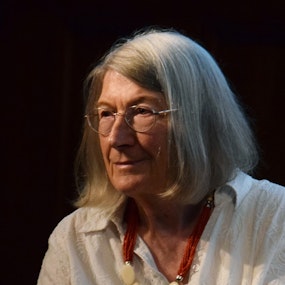
Our Brutal Fathers

How did patriarchy first begin? The answers to that question are many and varied, and most often tries to explain it by one single factor - Agriculture! Private property! Men are stronger!
But - the history of patriarchal development is a lot more co...

How did patriarchy first begin? The answers to that question are many and varied, and most often tries to explain it by one single factor - Agriculture! Private property! Men are stronger!
But - the history of patriarchal development is a lot more complex and interesting than one single answer - and very few people have decoded what the evidence tells us about how patriarchal patterns arose and evolved in ancient Europe and Asia Minor - as deeply as research scholar Heide Goettner-Abendroth.
In past episodes we have covered Heide’s work on modern matriarchies (Ep 16:The Peacebuilders) as well as the history of matriarchal societies in ancient Europe and West Asia (Ep 25: The Mothers of Invention). Well, strap in - because in this third installment we are talking about how those ancient matriarchal cultures came to their dramatic ends. About how the first small cells of patriarchy began and then grew and took hold in different parts of the ancient world, how it spread and destroyed former matriarchal cultures. How matriarchal societies waged resistance and fought against their oppressors to protect their egalitarian way of life, but how in the end those brutal forefathers prevailed and shaped the world we live in today.
Credits
Host: Elle Kamihira
Produced by Elle Kamihira
Audio Engineering by Jason Sheesley at Abridged Audio
Cover Art by Bee Johnson
Music by Beware of Darkness

Dr. Heide Goettner-Abendroth
Founder & Director of International Academia Hagia of Modern Matriarchal Studies
Dr. Heide Goettner-Abendroth is a mother and a grandmother. She earned her Ph.D. in philosophy of science at the University of Munich where she lectured for ten years (1973-1983).
She has published on philosophy of science, and extensively on matriarchal society and culture, and through her lifelong research on matriarchal societies has become the founder of Modern Matriarchal Studies. Her main works are Matriarchal Societies: Studies on Indigenous Cultures across the Globe, (New York 2013, Peter Lang) in which she defines scientifically this new field of knowledge and provides a world tour of examples of contemporary matriarchal cultures; Matriarchal Societies of the Past and the Rise of Patriarchy in West Asia and Europe (New York 2022, Peter Lang) in which she uses her deep knowledge about matriarchal societies to review archaeological records and re-write the history of cultures.
She has been visiting professor at the University of Montreal in Canada, and the University of Innsbruck in Austria. She lectured extensively at home and abroad. In 1986, she founded the International Academy HAGIA for Modern Matriarchal Studies in Germany, and since then has been its director.
In 2003, 2005 and 2011 she guided three World Congresses on Matriarchal Studies in Europe and the U.S.A. She was twice a nominee for the Nobel Peace Prize, in 2005 by a Swiss initiative, in 2008 by a Finish initiative.









